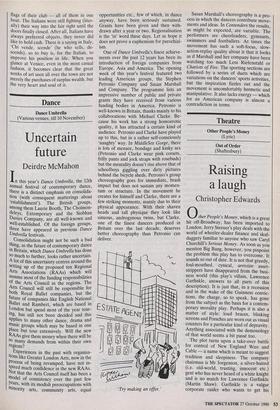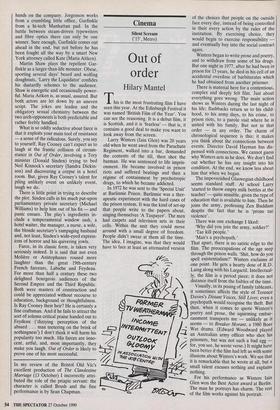Theatre
Other People's Money (Lyric) Out of Order (Shaftesbury)
Raising a laugh
Christopher Edwards
0 ther People's Money, which is a great hit off-Broadway, has been imported to London. Jerry Sterner's play deals with the world of wheeler-dealer finance and skul- duggery familiar to anyone who saw Caryl Churchill's Serious Money. As soon as you mention Big Bang, however, you pinpoint the problem this play has to overcome. It sounds so out of date. It is not that greedy, foul-mouthed, ' cynical, arriviste asset- strippers have disappeared from the busi- ness world (this play's villain, Lawrence Garfinkle, answers to all parts of this description). It is just that, in a recession and in the wake of the Guinness convic- tions, the charge, so to speak, has gone from the subject as the basis for a contem- porary morality play. Perhaps it is also a matter of style: loud braces, blinking screens and Porsches are worn out as visual counters for a particular kind of depravity. Anything associated with the demonology of that world seems a bit passé too. The plot turns upon a take-over battle for control of New England Wire and Cable — a name which is meant to suggest tradition and sleepiness. The company chairman is Mr Jorgenson, a silver-haired (i.e. old-world, trusting, innocent etc.) gent who has never heard of a white knight and is no match for Lawrence Garfinkle (Martin Shaw). Garfinkle is a vulgar corporate raider who wants to get his hands on the company. Jorgenson works from a crumbling little office, Garfinkle from a hi-tech Manhattan pad. In the battle between steam-driven typewriters and fibre optics there can only be one winner. Sure enough, Garfinkle comes out ahead in the end, but not before he has been fought all the way by a smart New York attorney called Kate (Maria Aitken).
Martin Shaw plays the repellent Gar- finkle as a larger-than-life monster. Obese, sporting several days' beard and wolfing doughnuts, 'Larry the Liquidator' confides his dastardly schemes to the audience. Shaw is energetic and occasionally power- ful. Maria Aitken is, as usual, assured. But both actors are let down by an uneven script. The jokes are leaden and the obligatory sexual chemistry between the two arch-opponents is both predictable and rather feebly handled.
What is so oddly seductive about farce is that it exploits your main tool of resistance — a sense of the ridiculous. Surely, you say to yourself, Ray Cooney can't expect us to laugh at the frantic collision of circum- stance in Out of Order, involving a Tory minister (Donald Sinden) trying to bed Neil Kinnock's secretary (Sandra Dickin- son) and discovering a corpse in a hotel room. But, given Ray Cooney's talent for piling unlikely event on unlikely event, laugh we do.
There is little point in trying to describe the plot. Sinden calls in his much put-upon parliamentary private secretary (Michael Williams) to help him out of his fix — and panic ensues. The play's ingredients in- clude a temperamental window sash, a hotel waiter, the manager, a nurse, a wife, the blonde secretary's rampaging husband and, not least, Sinden's wide-eyed express- ions of horror and his quivering jowls.
Farce, in its classic form, is taken very seriously indeed. It is said that not even Moliere or Aristophanes roused more laughter than the great 19th-century French farceurs, Labiche and Feydeau. For more than half a century these two delighted bourgeois audiences of the Second Empire and the Third Republic. Both were masters of construction and could be appreciated without recourse to education, background or thoughtfulness. Is Ray Cooney their heir? He is certainly a fine craftsman. And if he fails to attract the sort of solemn critical praise handed out to Feydeau (`dizzying perception of the absurd . . . man teetering on the brink of nothingness') I don't think it will harm his popularity too much. His farces are inno- cent, artful, and, most importantly, they make you laugh. Out of Order is likely to prove one of his most successful.
In my review of the Bristol Old Vic's excellent production of The Clandestine Marriage (13 October) I incorrectly attri- buted the role of the priapic servant: the character is called Brush and the fine performance is by Sean Chapman.



































































 Previous page
Previous page